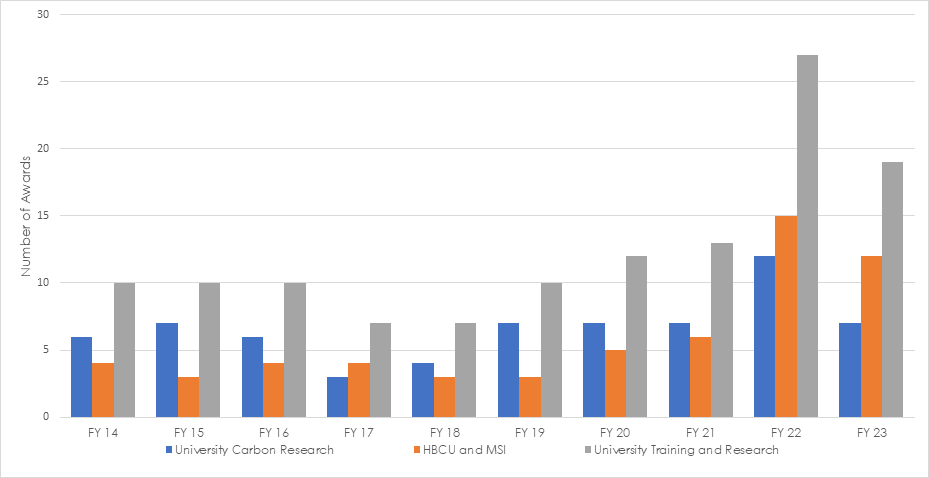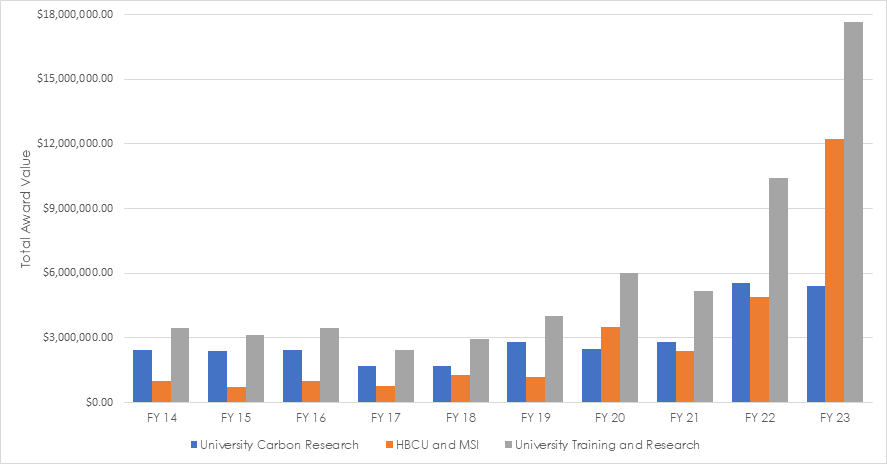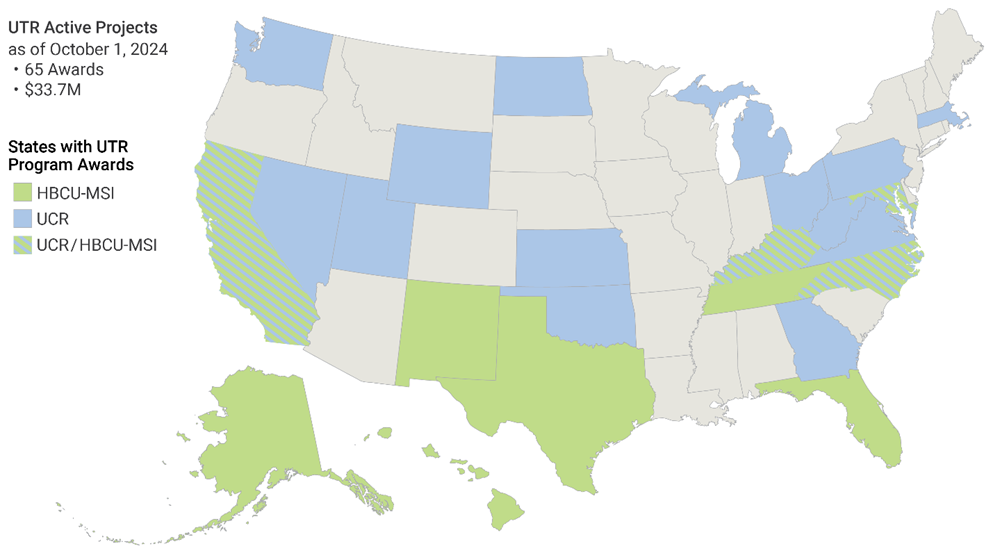University Training and Research
Preparing the next generation to meet future energy challenges
The University Training and Research (UTR) program supports early-stage research at U.S. colleges and universities that advances the Office of Fossil Energy and Carbon Management (FECM) mission of delivering integrated solutions while strengthening U.S. energy and critical minerals security.
By investing in the education and training of America’s future scientists and engineers, this program highlights the key role technology plays in addressing America’s energy challenges, promotes the development of innovative and disruptive technologies, and reinforces workforce development as a part of our nation’s continued economic prosperity. The UTR program provides opportunities in science, technology, engineering, and mathematics (STEM) fields, broadening the impact of FECM’s portfolio and strengthening America’s workforce.
UTR comprises programs in Historically Black Colleges and Universities and Minority Serving Institutions (HBCU–MSI) and University Carbon Research (UCR). The core mission of both programs is the following:
- To educate and train the next generation of engineers and scientists to help develop and contribute to a highly skilled, and competitive U.S. workforce and economy
- To support novel early-stage research at U.S. colleges and universities toward integrated solutions related to fossil energy
- To increase research and development (R&D) opportunities and tap into the innovative thinking of student researchers at institutions of higher learning
- To ensure that students are being equipped with cutting-edge, translatable skill sets that will allow them to contribute to the U.S. workforce and greater economy over the course of a long and enduring career
Between fiscal years 2014 and 2023, the UTR program made 125 R&D awards valued at more than $58.90 million and helped to support 398 students at various stages in their academic careers, including undergraduate, master’s, and PhD levels.
The UTR program conducts a nationwide competitive solicitation each year. Research and development projects are awarded as grants ($200,000-1,500,000) with a typical duration of two to three years. This educational outreach initiative enhances the Department of Energy’s ability to develop and sustain a national program of university research that seeks technology development and train the energy workforce of the future.
A yearly breakdown of awards over the past decade is shown in the Figures below.

Yearly breakdown of awards over the past decade

Yearly awarded project values over the past decade
Fundamental And Applied Research
The program provides a mechanism for cooperative research among MSIs, the private sector, and Federal agencies. The central thrust of the program is to generate fresh ideas and tap unique talent, define applicable fundamental scientific principles, and develop advanced concepts for generating new and improved technologies across the full spectrum of FECM’s R&D programs. Since its inception, the program has emphasized improving the capabilities of next-generation environmentally sustainable energy systems.
As of October 1, 2024 (first quarter of FY 24), there were 53 active UTR projects: the product of eight different Funding Opportunity Announcements (FOAs). Figure 2 below shows the location of participating universities and colleges for the UTR program, with breakdown of the participating institutions location into the HBCU-MSI and UCR sub-programs, which are described further below.

Figure 2. Active UTR Program Awards States
Historically Black Colleges And Universities And Minority Serving Institutions Program
For more than 30 years, FECM and NETL have supported the HBCU–MSI program, making it one of the longest-running university training initiatives within DOE. The key objective for HBCU–MSI program includes equipping student groups with cutting-edge, translatable skillsets through R&D opportunities that will help them sustain successful STEM careers.
University Carbon Research (UCR) Program
The UCR program provides funding to colleges and universities to support early-stage research and education surrounding new technology development and deployment consistent with FECM’s goals. The program provides a threefold benefit: (1) conducting directed energy research in an innovative environment; (2) expanding the research capabilities and education of students in STEM; and (3) developing research-based solutions to support Administration R&D goals.
Current Research Thrusts
The UTR program supports novel, early-stage research on wide array of technologies.
- Point-Source Carbon Capture (PSC): reduce the cost, increase the efficacy, and advance deployment of commercial-scale PSC technologies in the power and industrial sectors implications.
- CO2 Conversion: accelerate capabilities for large-scale conversion of CO2 into products, facilitated by markets for CO2 as a feedstock.
- Carbon Dioxide Removal (CDR): diverse approaches supporting DOE’s Carbon Negative Shot, addressing emissions from hard-to-decarbonize sectors and eventually legacy emissions.
- Reliable Carbon Storage and Transport: advance storage technologies and transport mechanisms and support large-scale transport and storage facilities and regional hubs.
- Hydrogen with Carbon Management: develop hydrogen production from sustainably sourced carbon-based feedstocks coupled with carbon capture and storage; hydrogen storage; reversible solid oxide fuel cells; and hydrogen-fired generating turbines.
- Domestic Critical Minerals (CM) Production: develop and demonstrate technologies from extraction and remediation to processing and refining CM for a strong supply chain and good jobs.
- Methane Mitigation: reduce and eliminate non-trivial methane emissions sources to ensure a safe, reliable, and resilient natural gas supply chain.









